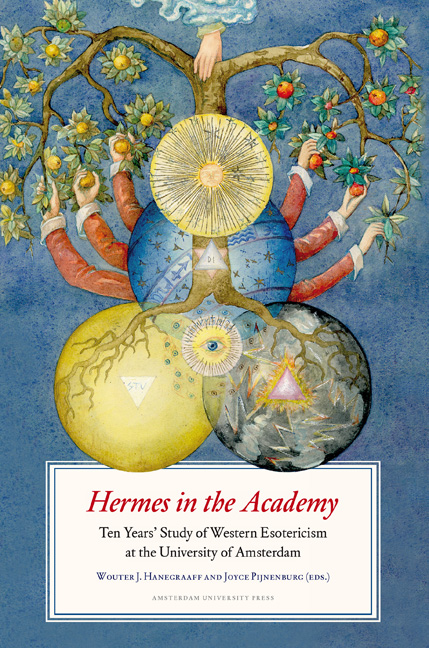From Paris to Amsterdam and Beyond: Origins and Development of a Collaboration
Published online by Cambridge University Press: 20 January 2021
Summary
Sometimes events retroactively exert an influence on things that have contributed to their coming about. Thus, the center for “History of Hermetic Philosophy and Related Currents,” the foundation of which was part of an ongoing process of institutionalization, has left its mark on its antecedents. Among these is a French institute that belongs to the proto-history and history of the center whose tenth anniversary we are celebrating.
One reason for the ideological and political tensions that France experienced since the beginning of the Third Republic was the controversy over what is known as laïcité. The Parliament resolved this question partially by passing a Law on the Separation of the Churches and the State in 1905. A measure that preceded this law was the establishment – realized in 1886 – of a Department of Religious Studies (“Section des Sciences Religieuses”) within the Ecole Pratique des Hautes Etudes in Paris, in addition to the already existing Departments (“Sections”) devoted to various disciplines. The foundation of this Department was part of an effort at phasing out the Church's monopoly on education concerning the “religious.” The Department was, and still is, secular (laïque), that is, non-confessional (non-“religionist”), just like all other organizations for education or research in the public sector.
At the time of its foundation, the Department of Religious Studies comprised hardly ten chairs, called Directions d’Étude. Having gradually incorporated domains such as the history of Christian mysticism and late antique gnosis, and having opened itself to ethnology and sociology as well, it has 61 chairs at present. Hence, the number of specializations concerning the various faits religieux (facts of religion), as we call them, have multiplied. Until 1964, such initiatives merely followed general tendencies in previous French as well as international research, and were, therefore, not really innovative. In that year, however, the department assigned to one of the Directions d’Études, whose chair was now vacant, a new title which no other official institution – whether in France or abroad – had ever listed in its programs: “History of Christian Esotericism.”
Although the majority of colleagues who were asked to pronounce on the title voted in its favor, this does not mean that they had engaged in an actual debate about the meaning that should be ascribed to it.
- Type
- Chapter
- Information
- Hermes in the Academy , pp. 123 - 128Publisher: Amsterdam University PressPrint publication year: 2009

